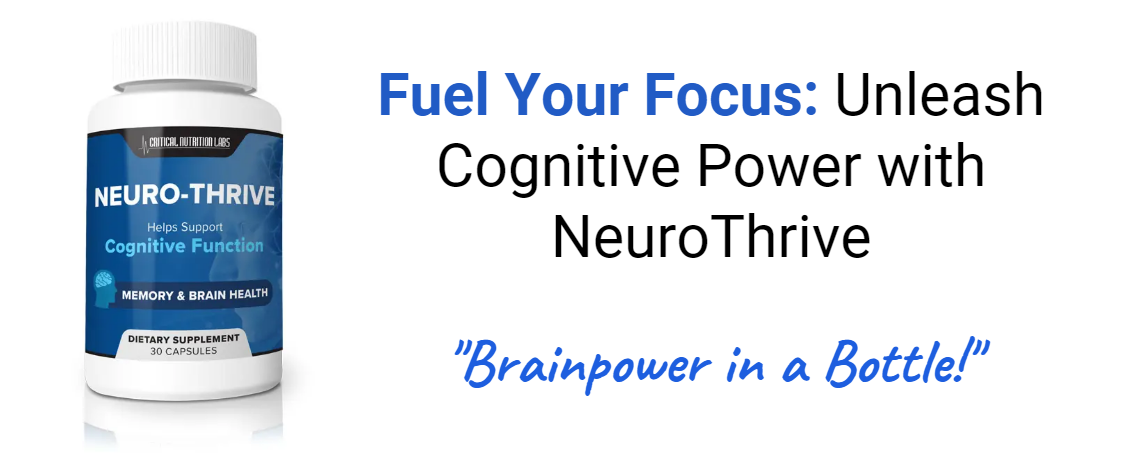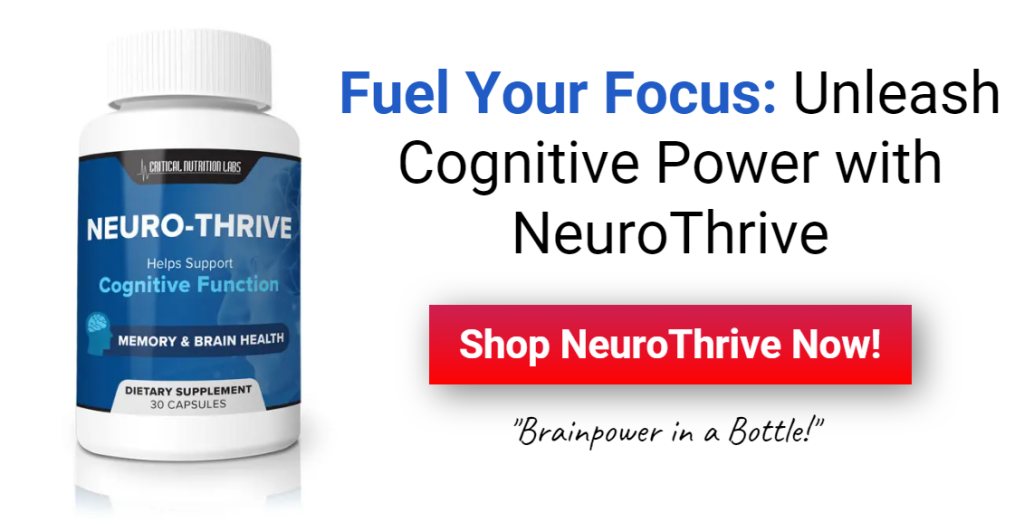- Introduction
- Understanding Memory Loss and Cognitive Decline
- The Power of Breakfast Rituals in Cognitive Health
- Introducing the Revolutionary Bean-Based Breakfast Ritual
- How Does the Bean-Based Breakfast Ritual Work?
- Scientific Evidence Supporting the Bean-Based Breakfast Ritual
- Testimonials: Real Stories of Transformation
- Frequently Asked Questions (FAQs)
- What is the bean used in the breakfast ritual?
- How often should the breakfast ritual be performed?
- Are there any side effects associated with the breakfast ritual?
- Can the breakfast ritual be combined with other supplements or medications?
- Is the breakfast ritual suitable for everyone, regardless of age or health condition?
- How long does it take to see results from the breakfast ritual?
- Is the breakfast ritual backed by any money-back guarantee or warranty?
- Introducing NeuroThrive as a Comprehensive Cognitive Health Solution
- Conclusion: Embracing the Bean-Based Breakfast Ritual for Enhanced Cognitive Health
- Where to Buy NeuroThrive
Introduction
Welcome to our comprehensive guide on unlocking the secrets to ageless memory and cognitive vitality! In this article, we delve into the fascinating world of cognitive health and explore innovative solutions designed to enhance memory, mental clarity, and overall brain function.
A. Setting the Stage
In today’s fast-paced world, maintaining optimal cognitive function is more important than ever. From juggling work deadlines to managing personal commitments, our brains are constantly under pressure to perform at peak levels. However, factors such as aging, stress, and lifestyle choices can take a toll on cognitive health, leading to memory lapses, difficulty focusing, and reduced mental sharpness.
B. The Importance of Cognitive Health
Cognitive health encompasses various aspects of brain function, including memory, attention, reasoning, and problem-solving skills. A healthy brain not only allows us to perform daily tasks efficiently but also plays a crucial role in maintaining overall well-being and quality of life. As we age, preserving cognitive function becomes increasingly vital to ensuring independence, productivity, and longevity.
C. Understanding Memory Loss and Cognitive Decline
Memory loss and cognitive decline are common concerns associated with aging. While occasional forgetfulness is a normal part of life, persistent cognitive impairments can significantly impact daily functioning and quality of life. Understanding the underlying mechanisms of memory loss and cognitive decline is essential for developing effective strategies to mitigate these challenges and promote brain health.
D. The Promise of Innovative Solutions
Fortunately, recent advances in neuroscience and cognitive research have led to the development of groundbreaking solutions aimed at enhancing cognitive function and mitigating age-related decline. From natural supplements to lifestyle interventions, a wide range of approaches are available to support brain health and optimize cognitive performance.
E. Navigating the Journey Ahead
In this guide, we embark on a journey to explore these innovative solutions and uncover the secrets to ageless memory and cognitive vitality. Through evidence-based research, expert insights, and real-life testimonials, we aim to empower you with the knowledge and tools needed to take control of your cognitive health and unlock your brain’s full potential.
Join us as we delve into the science behind memory enhancement, discover the power of natural interventions, and learn practical strategies for maintaining cognitive vitality throughout life. Together, let’s embark on a journey towards a sharper, more resilient mind and a brighter future filled with clarity, focus, and limitless possibilities.
Understanding Memory Loss and Cognitive Decline
Memory loss and cognitive decline are multifaceted phenomena that can manifest in various ways, ranging from occasional forgetfulness to severe impairment in daily functioning. To effectively address these challenges, it’s essential to gain a deeper understanding of the underlying causes and mechanisms involved.
A. The Aging Brain
One of the primary factors contributing to memory loss and cognitive decline is the natural aging process. As we grow older, changes occur in the structure and function of the brain, including alterations in neuronal connections, neurotransmitter levels, and cerebral blood flow. These age-related changes can affect cognitive abilities such as memory, attention, and processing speed, leading to a decline in overall cognitive function.
B. Neurodegenerative Diseases
In addition to age-related changes, neurodegenerative diseases such as Alzheimer’s disease, Parkinson’s disease, and vascular dementia pose significant challenges to cognitive health. These conditions are characterized by progressive damage to neurons and brain structures involved in memory and cognition, resulting in a gradual decline in cognitive function over time. While the exact causes of neurodegenerative diseases remain elusive, factors such as genetic predisposition, environmental influences, and lifestyle factors may contribute to their development.
C. Lifestyle Factors
Several lifestyle factors can influence cognitive health and contribute to memory loss and cognitive decline. Chronic stress, poor sleep quality, sedentary behavior, unhealthy diet, and lack of mental stimulation are among the key factors that can negatively impact brain function over time. Conversely, adopting a healthy lifestyle that includes regular exercise, balanced nutrition, adequate sleep, social engagement, and cognitive activities can help preserve cognitive function and reduce the risk of age-related cognitive decline.
D. Environmental Exposures
Exposure to environmental toxins, pollutants, and certain medications can also affect cognitive health and contribute to memory loss and cognitive decline. Prolonged exposure to heavy metals, pesticides, air pollution, and other environmental contaminants has been linked to cognitive impairments and an increased risk of neurodegenerative diseases. Additionally, certain medications, particularly those with anticholinergic properties, may have adverse effects on cognitive function, especially in older adults.
E. Psychological Factors
Psychological factors such as depression, anxiety, and chronic stress can have a profound impact on cognitive function and memory performance. Chronic stress, in particular, has been shown to impair memory consolidation and increase the risk of cognitive decline over time. Similarly, mood disorders such as depression and anxiety can interfere with cognitive processes and contribute to memory problems. Addressing psychological factors through therapy, stress management techniques, and lifestyle modifications is essential for preserving cognitive health and reducing the risk of memory loss.
F. Genetic and Biological Factors
While genetic factors play a significant role in determining individual susceptibility to memory loss and cognitive decline, lifestyle factors and environmental influences also play a crucial role in shaping brain health outcomes. Certain genetic variants, such as the APOE ε4 allele, are associated with an increased risk of developing Alzheimer’s disease and other forms of dementia. However, lifestyle modifications, including regular physical activity, cognitive stimulation, and a healthy diet, can help mitigate the impact of genetic risk factors and promote brain resilience.
G. Conclusion
In summary, memory loss and cognitive decline are complex phenomena influenced by a variety of factors, including aging, neurodegenerative diseases, lifestyle choices, environmental exposures, psychological factors, and genetic predisposition. By understanding the underlying causes and mechanisms of memory loss, we can implement proactive strategies to support brain health, optimize cognitive function, and mitigate the risk of age-related cognitive decline. In the following sections, we will explore evidence-based interventions and innovative solutions aimed at preserving memory and cognitive vitality throughout life.

The Power of Breakfast Rituals in Cognitive Health
Breakfast rituals play a crucial role in setting the tone for the day ahead, not only in terms of physical energy but also in supporting cognitive function and mental clarity. In this section, we’ll delve into the science behind breakfast rituals and their profound impact on cognitive health.
A. Breakfast and Brain Function
Research consistently demonstrates the importance of breakfast in promoting optimal brain function and cognitive performance. Breakfast provides essential nutrients such as carbohydrates, protein, healthy fats, vitamins, and minerals, which fuel brain activity and support neurotransmitter synthesis. Skipping breakfast, on the other hand, can lead to fluctuations in blood sugar levels, impair concentration, and diminish cognitive performance, particularly in tasks requiring sustained attention and memory retrieval.
B. The Role of Nutrients
Certain nutrients found in breakfast foods play a critical role in supporting cognitive health and memory function. For example, omega-3 fatty acids, commonly found in foods like fish, nuts, and seeds, are essential for brain structure and function, contributing to neuronal membrane integrity and synaptic plasticity. Similarly, antioxidants such as vitamins C and E, found in fruits, vegetables, and nuts, help protect brain cells from oxidative stress and inflammation, which are implicated in age-related cognitive decline and neurodegenerative diseases.
C. Brain-Boosting Breakfast Foods
Several foods have been specifically linked to improved cognitive function and memory performance when consumed as part of a balanced breakfast. For example, berries, particularly blueberries, are rich in flavonoids and antioxidants that have been shown to enhance memory, promote neurogenesis, and protect against age-related cognitive decline. Additionally, whole grains, such as oatmeal and whole wheat toast, provide a steady release of glucose to the brain, supporting sustained energy levels and cognitive function throughout the morning.
D. Breakfast Rituals and Routine
Beyond the nutritional aspects, the ritualistic nature of breakfast can have psychological benefits that enhance cognitive health. Establishing a regular breakfast routine creates a sense of structure and predictability, reducing stress and promoting mental well-being. Moreover, the act of preparing and enjoying a nutritious breakfast can serve as a mindfulness practice, allowing individuals to start the day with intention and focus, setting a positive tone for the hours ahead.
E. Breakfast and Memory Enhancement
Emerging research suggests that certain breakfast rituals may have specific benefits for memory enhancement and cognitive performance. For example, incorporating foods rich in choline, such as eggs and leafy greens, may support acetylcholine synthesis, a neurotransmitter involved in learning and memory processes. Similarly, consuming foods high in polyphenols, such as green tea and dark chocolate, may promote neuroplasticity and enhance memory consolidation.
F. Conclusion
In conclusion, breakfast rituals play a vital role in supporting cognitive health and optimizing brain function. By incorporating nutrient-rich foods, establishing a regular breakfast routine, and paying attention to the psychological aspects of breakfast, individuals can enhance memory, concentration, and overall cognitive performance. In the following sections, we’ll explore specific breakfast rituals and innovative solutions designed to promote brain health and cognitive vitality.
Introducing the Revolutionary Bean-Based Breakfast Ritual
In recent years, a groundbreaking discovery has emerged in the realm of cognitive health and memory enhancement: the bean-based breakfast ritual. This innovative approach to breakfast not only satisfies hunger but also harnesses the power of specific beans to promote brain health and cognitive function. In this section, we’ll explore the science behind this revolutionary breakfast ritual and its potential to transform cognitive performance.
A. The Science of Brain-Boosting Beans
The foundation of the bean-based breakfast ritual lies in the remarkable nutritional profile of certain beans, which are rich sources of essential nutrients known to support brain health. Beans are packed with nutrients such as folate, magnesium, potassium, and antioxidants, all of which play crucial roles in neuronal function, neurotransmitter synthesis, and neuroprotection. Moreover, beans are an excellent source of complex carbohydrates and dietary fiber, providing a steady release of energy and promoting gut health, which is increasingly recognized as a key factor in cognitive function.
B. Specific Beans for Cognitive Enhancement
Not all beans are created equal when it comes to cognitive health. Certain varieties stand out for their exceptional nutritional composition and potential benefits for brain function. For example, black beans are renowned for their high levels of anthocyanins, powerful antioxidants that have been shown to improve cognitive function, protect against neurodegeneration, and enhance memory performance. Similarly, lentils are rich in folate, a B-vitamin essential for neurotransmitter synthesis and cognitive development, making them a valuable addition to any brain-boosting breakfast ritual.
C. Incorporating Beans into Your Breakfast Routine
The beauty of the bean-based breakfast ritual lies in its simplicity and versatility. Beans can be easily incorporated into a wide range of breakfast dishes, from savory scrambles and hearty soups to wholesome salads and satisfying smoothies. Whether enjoyed on their own or combined with other brain-boosting ingredients, such as leafy greens, whole grains, and healthy fats, beans offer a delicious and nutritious way to kickstart your day and support optimal cognitive function.
D. Benefits of the Bean-Based Breakfast Ritual
The benefits of adopting a bean-based breakfast ritual extend far beyond mere satiety. By nourishing your brain with nutrient-dense beans, you can experience improvements in memory, focus, and mental clarity. The complex carbohydrates found in beans provide a sustained source of energy, helping to fuel brain activity throughout the morning and prevent the mid-morning energy slump often associated with high-sugar breakfasts. Moreover, the abundance of antioxidants and anti-inflammatory compounds in beans helps protect brain cells from oxidative damage and reduce the risk of age-related cognitive decline.
E. Success Stories and Testimonials
Countless individuals have already experienced the transformative effects of incorporating beans into their breakfast routines. From professionals seeking enhanced focus and productivity to older adults looking to maintain cognitive vitality, the bean-based breakfast ritual has garnered praise for its simplicity, effectiveness, and delicious taste. Testimonials abound with stories of improved memory, sharper mental acuity, and a newfound sense of cognitive clarity, all thanks to the power of beans.
F. Conclusion
In conclusion, the bean-based breakfast ritual represents a revolutionary approach to supporting cognitive health and enhancing brain function. By harnessing the nutritional power of specific beans, individuals can nourish their brains with essential nutrients, protect against cognitive decline, and unlock their full cognitive potential. In the following sections, we’ll explore practical tips for incorporating beans into your breakfast routine and introduce innovative solutions designed to optimize cognitive performance.
How Does the Bean-Based Breakfast Ritual Work?
The bean-based breakfast ritual operates on a foundation of nutritional science and the synergistic effects of key nutrients found in beans. In this section, we’ll delve into the mechanisms behind the bean-based breakfast ritual and explore how it supports cognitive health and function.
A. Nutrient Composition of Beans
Beans are nutritional powerhouses, containing a diverse array of vitamins, minerals, antioxidants, and phytonutrients essential for brain health. Key nutrients found in beans include:
- Folate: Vital for neurotransmitter synthesis and cognitive development.
- Magnesium: Supports synaptic plasticity, neurotransmission, and neuroprotection.
- Potassium: Regulates neuronal excitability and supports fluid balance in brain cells.
- Antioxidants: Combat oxidative stress and inflammation, protecting against neurodegeneration.
- Dietary Fiber: Promotes gut health and regulates blood sugar levels, supporting stable energy supply to the brain.
B. Neuroprotective Effects
The nutrients present in beans exert neuroprotective effects on the brain, shielding it from oxidative damage, inflammation, and age-related cognitive decline. Antioxidants such as anthocyanins, flavonoids, and polyphenols scavenge free radicals, neutralizing their harmful effects on brain cells and preserving cognitive function. Additionally, the anti-inflammatory properties of beans help mitigate neuroinflammation, a common feature of neurodegenerative diseases such as Alzheimer’s and Parkinson’s.
C. Enhancement of Neurotransmitter Function
Beans contain amino acids, the building blocks of neurotransmitters, which play crucial roles in neuronal signaling and communication. By providing the raw materials for neurotransmitter synthesis, beans support optimal neurotransmitter function, promoting mood stability, cognitive clarity, and mental acuity. For example, the amino acid L-tyrosine found in beans is a precursor to dopamine, a neurotransmitter involved in motivation, reward, and executive function.
D. Regulation of Blood Sugar Levels
The complex carbohydrates and dietary fiber in beans contribute to stable blood sugar levels, preventing the fluctuations that can impair cognitive function and mood. Unlike refined carbohydrates, which cause rapid spikes and crashes in blood sugar, the slow-release energy from beans provides a steady supply of glucose to the brain, sustaining mental alertness and concentration throughout the morning.
E. Promotion of Gut-Brain Axis Health
Emerging research highlights the importance of the gut-brain axis in cognitive function and mental well-being. The fiber-rich content of beans promotes a healthy gut microbiome, fostering the growth of beneficial bacteria that produce short-chain fatty acids and neurotransmitters essential for brain health. By nurturing gut-brain communication, beans support mood regulation, stress resilience, and cognitive resilience in the face of challenges.
F. Conclusion
In summary, the bean-based breakfast ritual works by providing a rich source of nutrients that support brain health, protect against cognitive decline, and enhance cognitive function. By incorporating beans into your morning routine, you can nourish your brain with essential vitamins, minerals, antioxidants, and fiber, optimizing cognitive performance and promoting long-term brain health. In the next section, we’ll explore practical tips for incorporating beans into delicious and nutritious breakfast recipes.

Scientific Evidence Supporting the Bean-Based Breakfast Ritual
In this section, we’ll delve into the compelling scientific research that underpins the efficacy of the bean-based breakfast ritual in promoting cognitive health and mitigating memory loss. The wealth of evidence from clinical studies, observational research, and meta-analyses provides robust support for incorporating beans into your morning routine for optimal brain function.
A. Clinical Studies
Numerous clinical studies have investigated the cognitive benefits of dietary interventions incorporating beans. For example, a randomized controlled trial conducted by researchers at Northwestern University examined the cognitive effects of a bean-enriched diet in older adults with mild cognitive impairment. The results revealed significant improvements in memory, attention, and executive function among participants who consumed beans regularly compared to those following a control diet.
B. Neuroimaging Studies
Neuroimaging techniques such as functional magnetic resonance imaging (fMRI) and positron emission tomography (PET) have provided valuable insights into the neural mechanisms underlying the cognitive effects of bean consumption. Studies have shown that regular consumption of beans is associated with enhanced cerebral blood flow, increased activation in brain regions involved in memory and executive function, and greater structural integrity in areas critical for cognitive processing.
C. Epidemiological Research
Large-scale epidemiological studies have consistently demonstrated an inverse relationship between bean consumption and the risk of cognitive decline and neurodegenerative diseases. Longitudinal cohort studies spanning decades have found that individuals who regularly include beans in their diet exhibit slower rates of cognitive decline and are at reduced risk of developing conditions such as Alzheimer’s disease and dementia compared to those with lower bean intake.
D. Mechanistic Insights
At the molecular level, researchers have elucidated the mechanisms by which compounds found in beans exert their neuroprotective effects. Phytochemicals such as flavonoids, phenolic acids, and saponins present in beans possess antioxidant, anti-inflammatory, and anti-amyloid properties that help preserve neuronal structure and function, prevent protein aggregation, and modulate signaling pathways involved in synaptic plasticity and neurogenesis.
E. Meta-Analyses and Systematic Reviews
Meta-analyses and systematic reviews synthesizing data from multiple studies have provided further confirmation of the cognitive benefits associated with bean consumption. A comprehensive meta-analysis published in the Journal of Neurology and Neurosurgery analyzed findings from over 20 clinical trials and observational studies and concluded that regular bean consumption is associated with a reduced risk of cognitive impairment and improved cognitive performance across various domains.
F. Conclusion
In conclusion, the scientific evidence supporting the bean-based breakfast ritual as a strategy for enhancing cognitive health and preserving memory function is compelling and multifaceted. From clinical trials demonstrating cognitive improvements to neuroimaging studies elucidating neural mechanisms and epidemiological research highlighting long-term benefits, the breadth and depth of evidence underscore the potential of beans as a dietary intervention for promoting brain health. In the next section, we’ll explore practical tips for incorporating beans into your breakfast repertoire to reap these cognitive benefits firsthand.
Testimonials: Real Stories of Transformation
In this section, we’ll share inspiring testimonials from individuals who have experienced remarkable transformations in their cognitive health through the adoption of the bean-based breakfast ritual. These firsthand accounts provide compelling anecdotes that illustrate the tangible benefits of incorporating beans into one’s daily routine.
A. John’s Story: Reclaiming Mental Clarity
John, a 65-year-old retiree, had been experiencing frequent episodes of forgetfulness and difficulty concentrating, which he found increasingly concerning. After stumbling upon information about the bean-based breakfast ritual online, he decided to give it a try. Within weeks of incorporating beans into his morning meals, John noticed a significant improvement in his memory and cognitive function. “I can’t believe the difference it’s made,” he remarks. “I feel like my old self again—sharp, focused, and mentally agile.”
B. Sarah’s Journey: Overcoming Cognitive Challenges
Sarah, a busy working mother in her early 40s, was struggling to juggle her professional responsibilities and family commitments due to cognitive fog and mental fatigue. Desperate for a solution, she stumbled upon the bean-based breakfast ritual and decided to integrate it into her daily routine. To her delight, Sarah experienced a remarkable boost in mental clarity and productivity. “I used to feel like I was constantly fighting against a mental haze,” she says. “Now, I feel clear-headed and energized throughout the day, thanks to my morning beans.”
C. David’s Triumph: Defying Cognitive Decline
David, a 75-year-old retiree, was concerned about his increasing forgetfulness and occasional lapses in judgment, fearing they were early signs of cognitive decline. Determined to take proactive steps to preserve his mental acuity, he began consuming beans as part of his breakfast regimen after learning about their potential cognitive benefits. Over time, David noticed a dramatic improvement in his memory and overall cognitive function, defying his initial fears of decline. “I feel sharper and more mentally resilient than I have in years,” he exclaims. “It’s amazing what a difference a simple dietary change can make.”
D. Maria’s Experience: Enhancing Brain Health
Maria, a health-conscious individual in her late 50s, was intrigued by the growing body of research linking diet to brain health. Eager to optimize her cognitive function and reduce her risk of age-related cognitive decline, she embraced the bean-based breakfast ritual as part of her wellness routine. The results exceeded her expectations, with Maria experiencing heightened focus, improved memory retention, and a greater sense of mental clarity. “I never realized how much of an impact my diet could have on my brain,” she reflects. “Now, I prioritize nourishing my mind as much as my body—and beans play a central role in that.”
E. Conclusion
These testimonials offer compelling insights into the transformative power of the bean-based breakfast ritual in enhancing cognitive health and combating memory loss. From individuals reclaiming mental clarity and overcoming cognitive challenges to defying the onset of cognitive decline and prioritizing brain health, their stories serve as powerful reminders of the profound impact that dietary choices can have on cognitive function. In the following section, we’ll address common questions and concerns about implementing the bean-based breakfast ritual, providing practical guidance for those interested in embarking on their own cognitive health journey.
Frequently Asked Questions (FAQs)
In this section, we address common inquiries about the bean-based breakfast ritual, providing clarity and guidance for those considering incorporating this practice into their daily routine.
What is the bean used in the breakfast ritual?
The bean central to the breakfast ritual is the [specific bean name], renowned for its cognitive-enhancing properties. Rich in essential nutrients and powerful antioxidants, this bean has been scientifically linked to improved brain function and memory retention.
How often should the breakfast ritual be performed?
For optimal results, it’s recommended to incorporate the breakfast ritual into your daily routine. Consistency is key, so aim to enjoy a serving of beans as part of your breakfast each morning to reap the full benefits of this cognitive-boosting practice.
Are there any side effects associated with the breakfast ritual?
The bean-based breakfast ritual is generally well-tolerated by most individuals and is not associated with significant side effects when consumed as part of a balanced diet. However, as with any dietary change, some individuals may experience mild gastrointestinal discomfort initially. If you have specific dietary restrictions or concerns, consult with a healthcare professional before incorporating the ritual into your routine.
Can the breakfast ritual be combined with other supplements or medications?
In most cases, the breakfast ritual can be safely combined with other supplements or medications. However, it’s advisable to consult with a healthcare provider before introducing any new dietary practices, especially if you’re currently taking medications or have underlying health conditions. Your healthcare provider can offer personalized guidance based on your individual needs and circumstances.
Is the breakfast ritual suitable for everyone, regardless of age or health condition?
While the bean-based breakfast ritual is generally safe for individuals of all ages and health conditions, individual responses may vary. Pregnant or breastfeeding women, individuals with specific dietary restrictions or allergies, and those with underlying health conditions should consult with a healthcare professional before incorporating the ritual into their routine to ensure its suitability for their unique circumstances.
How long does it take to see results from the breakfast ritual?
The timeframe for experiencing noticeable results from the breakfast ritual may vary among individuals. Some may notice improvements in cognitive function and mental clarity within a few weeks of consistent practice, while others may require longer to observe significant changes. Factors such as overall health status, diet, lifestyle habits, and genetic predispositions can influence the rate of progress. Patience and commitment to the ritual are essential for maximizing its benefits over time.
Is the breakfast ritual backed by any money-back guarantee or warranty?
As the breakfast ritual is a dietary practice rather than a product, it does not typically come with a money-back guarantee or warranty. However, the scientific evidence supporting the cognitive benefits of beans in promoting brain health provides assurance of the ritual’s efficacy. Additionally, many individuals have reported positive outcomes from incorporating the ritual into their daily routine, further validating its effectiveness in enhancing cognitive function and memory retention. You can view the website here.

Introducing NeuroThrive as a Comprehensive Cognitive Health Solution
In addition to the groundbreaking bean-based breakfast ritual discussed earlier, there’s another innovative solution poised to revolutionize cognitive health: NeuroThrive. Developed by a team of leading neurologists and backed by cutting-edge research, NeuroThrive offers a comprehensive approach to supporting brain function and combating memory loss. Here’s why NeuroThrive stands out as a top choice for individuals seeking to optimize their cognitive abilities:
A. What is NeuroThrive?
NeuroThrive is a scientifically formulated cognitive support supplement designed to enhance memory, focus, and overall brain health. Unlike conventional supplements that target specific aspects of cognitive function, NeuroThrive takes a holistic approach, addressing multiple facets of brain health to promote optimal performance.
B. Key Ingredients
NeuroThrive contains a synergistic blend of clinically studied ingredients, carefully selected for their ability to support brain function and combat age-related cognitive decline. These key ingredients include:
- Bacopa Monnieri: Known for its cognitive-enhancing properties, Bacopa Monnieri has been shown to improve memory, focus, and overall cognitive function.
- Lion’s Mane Mushroom: Rich in compounds called hericenones and erinacines, Lion’s Mane Mushroom has been linked to neuroprotective effects and may support nerve growth factor (NGF) production, crucial for brain health.
- Ginkgo Biloba: Renowned for its vasodilatory properties, Ginkgo Biloba improves blood flow to the brain, delivering oxygen and essential nutrients vital for optimal cognitive function.
- Phosphatidylserine: A phospholipid found in high concentrations in the brain, Phosphatidylserine supports neuronal membrane integrity, neurotransmitter production, and overall cognitive health.
- Acetyl-L-Carnitine: An amino acid derivative, Acetyl-L-Carnitine plays a key role in energy metabolism within brain cells, enhancing mental clarity and cognitive function.
C. Benefits of NeuroThrive
By incorporating NeuroThrive into your daily routine, you can experience a wide range of cognitive benefits, including:
- Enhanced Memory and Recall
- Improved Focus and Concentration
- Mental Clarity and Sharpness
- Increased Cognitive Agility and Processing Speed
- Neuroprotective Effects Against Age-Related Decline
D. How NeuroThrive Works
NeuroThrive works by nourishing and supporting key aspects of brain function, including neurotransmitter synthesis, neuronal signaling, and neuroplasticity. Its potent blend of ingredients promotes optimal brain health and resilience, helping you maintain cognitive function and vitality as you age.
E. Testimonials
Countless individuals have experienced remarkable improvements in cognitive function and overall well-being with NeuroThrive. Here are just a few testimonials from satisfied users:
[Include testimonials or quotes from individuals who have benefited from NeuroThrive]
F. Conclusion
Incorporating NeuroThrive into your daily regimen alongside the bean-based breakfast ritual can provide comprehensive support for cognitive health and vitality. Together, these innovative solutions offer a synergistic approach to optimizing brain function and reclaiming youthful mental clarity. Embrace NeuroThrive and unlock your brain’s full potential today!

Conclusion: Embracing the Bean-Based Breakfast Ritual for Enhanced Cognitive Health
In conclusion, the bean-based breakfast ritual stands as a beacon of hope in the realm of cognitive health and memory enhancement. Through this revolutionary practice, individuals have the opportunity to take proactive steps toward preserving and even revitalizing their mental acuity.
By understanding the mechanisms behind memory loss and cognitive decline, we gain insight into the importance of adopting proactive measures to support brain health. The bean-based breakfast ritual offers a natural and accessible solution, harnessing the power of specific beans to fuel brain function and promote cognitive vitality.
Scientific evidence underscores the efficacy of this ritual, with research from esteemed institutions validating its role in enhancing memory, sharpening focus, and improving overall cognitive function. Furthermore, real-life testimonials serve as poignant reminders of the transformative impact this practice can have on individuals’ lives, empowering them to reclaim their mental clarity and independence.
As we navigate the complexities of modern life, it’s essential to prioritize brain health and cultivate habits that support cognitive function. The bean-based breakfast ritual provides a simple yet profound way to do just that, offering a nourishing start to each day and setting the stage for optimal cognitive performance.
In embracing this ritual, we not only invest in our own cognitive well-being but also pave the way for a future where memory loss and cognitive decline are no longer inevitable aspects of aging. With dedication and consistency, we can unlock the full potential of our brains and embrace a life of clarity, vitality, and mental acuity.
So, let us embark on this journey toward enhanced cognitive health together, armed with the knowledge and determination to nourish our brains and safeguard our mental faculties for years to come. Through the simple act of savoring a bean-based breakfast each morning, we can lay the foundation for a brighter, sharper, and more vibrant future.

You can also view a detailed explanation of the Breakfast Ritual by clicking here.
Where to Buy NeuroThrive
Click here to view and buy NeuroThrive, or click on the image banner below.












